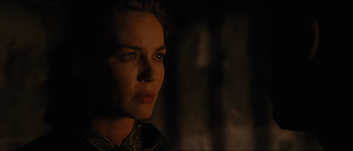
Lucilla and The Representation of Women
Lucilla plays a more crucial and well-developed role in this film than most women in this particular genre. She has almost complete agency while also commanding respect. At the beginning of the movie, Lucilla saves Commodus from humiliation by interrupting his power-hungry monologue against the Senate. As Commodus is sent away, Senator Gracchus tells Lucilla “Your lightest touch commands obedience.” This is after the audience finds out Marcus Aurelius wanted her as an heir if not for her gender. She is presented as a true leader who is intelligent and rational rather than a simple love interest.
Lucilla creates the logistics and sets into motion almost the entire plan to overthrow Commodus. She uses people's assumptions that she is only sleeping with Gladiators to pay for “time” with Maximus. While alone with him, she informs him of the roadmaps to the plan and the part he needs to play. She then buys his freedom so the scheme can be carried out. Her actions progress the story in such a magnitude that one of the only possible comparisons from this genre would be Cleopatra from the Elizabeth Taylor Movie. Although Cleopatra still has to deal with Julius Ceasar abusing the power dynamic of their relationship, that only speaks to the cultural context in which the movie was made. Her status as an educated intellectual and leader coupled with her lack of tolerance towards Marc Antony's undignified behavior out of self-pity was groundbreaking. Unfortunately, in the movie and historically she still endures the loss of her empire and her family.
In other movies that take place in the Roman Empire, women commonly exist only to support the man's storyline. In this movie, Lucilla’s mission is to save Rome and her son. In Spartacus, Verinia is there to juxtapose Spartacus’ versus the Roman’s treatment of women and to serve as a love interest. In Quo Vadis, the female counterpart, Lygia, loosens her morals to tolerate the male main character, Marcus Vinicius. In the movie-musical A Funny Thing Happened on the Way to the Forum, women are mostly sex objects for the men to play with, or plain stupid.
One could argue that the movie's inclusivity of women is limited since there is only one main woman and she is in love with the main male. Yes, the movie could have used a greater amount of characters that were not men. However, her love for Maximus is an almost negligible portion of her motivations for overthrowing Commodus. She cares for her son, whose life she fears is in jeopardy as he is the heir while Commodus does not have a good history of tolerating those who threaten his reign. She cares for Rome and wants to see it thrive so she works with the senate dealing with Rome's affairs while Commodus enjoys the luxuries of being the Emperor and the quest for requited love (see the Daddy Issues segment). She wants to feel free. With Commodus around, she must walk on her toes to not anger him. She could not mourn the death of her father without fear. All of these aspects of Lucilla add to her multidimensional character and rewrite the narratives of women that these old Roman movies created.
Lucilla also steps back when she knows Maximus has a wife. She respects his wife and Maximus’ commitment to her. She doesn’t sacrifice her dignity fighting for the attention of a man, she knows her worth and doesn’t settle for second choice. She continuously proves her intelligence, wisdom, and understanding. This movie engages with a female audience in a significantly less condescending manner than previously portrayed tropes of this genre. This increases engagement and draws in a larger demographic than before.


